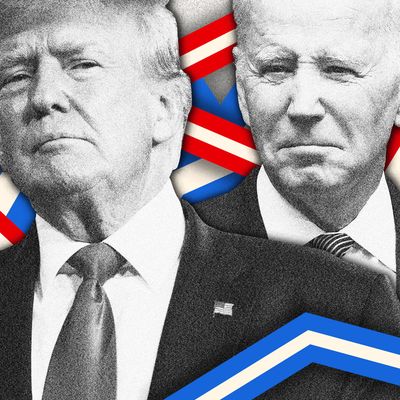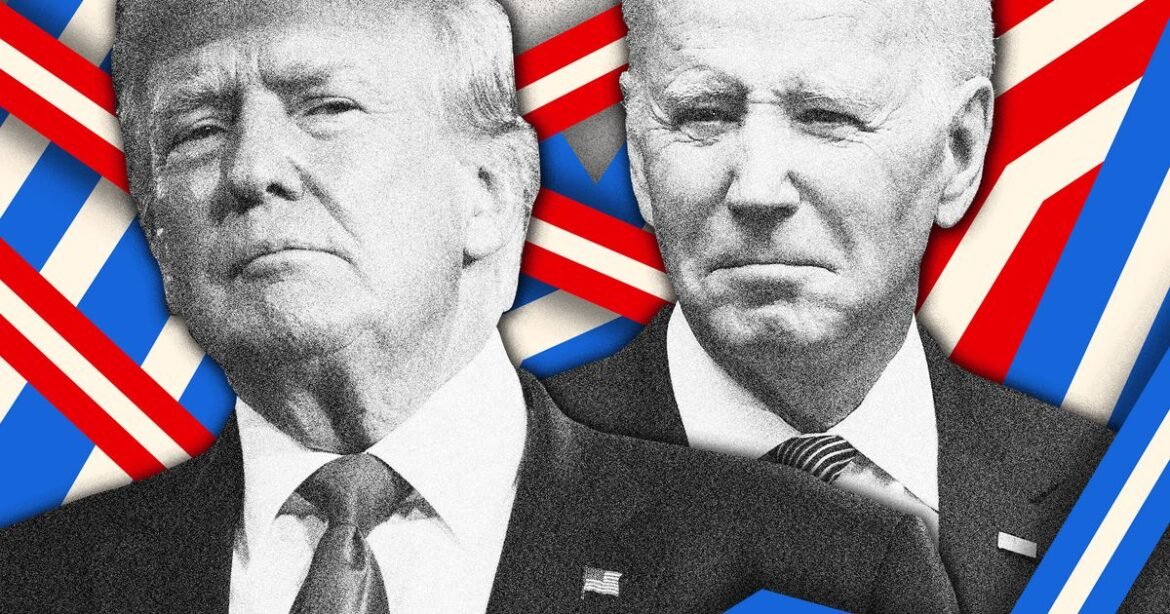
Photo-Illustration: Intelligencer; Photos: Getty Images
In assessing the rematch between Joe Biden and Donald Trump on tap for November 2024, it is important to remember that their national popular-vote standing as illustrated by various polls (some head-to-head, others featuring possible additional candidates) is not necessarily the determining factor in the outcome. Thanks to our Electoral College system, it’s entirely possible to be elected president while losing the popular vote; indeed, that’s how we got George W. Bush in 2000 and Donald Trump in 2016. Hillary Clinton beat Trump by a 2.1 percent popular-vote margin and still lost the election, and in 2020, Trump came within 42,000 votes of putting together an Electoral College majority even though Biden beat him handily in the national popular vote (by 4.5 percent).
The simplest way to explain this dichotomy is that Democratic votes are distributed less efficiently among the states. That’s not an eternal truth; John Kerry in 2004 and Barack Obama in both 2008 and 2012 overperformed their popular-vote margins in the Electoral College. But you can understand why Democrats fear that Biden needs to actually be well ahead of Trump in the national popular vote in order to win, and why polls showing Trump ahead or the contest tied alarm them. This concern has been reinforced by periodic polling of perceived battleground states (typically the ones that were very close in 2020) that show Biden in trouble.
In the most recent batch of battleground state polls, from Bloomberg–Morning Consult, Biden trailed Trump in a head-to-head matchup by nine points in North Carolina, six points in Arizona, Georgia, Michigan, and Nevada, four points in Wisconsin, and two points in Pennsylvania. In a five-way trial heat including Robert F. Kennedy Jr., Cornel West, and Jill Stein, Trump’s lead ballooned to ten points in North Carolina, nine points in Arizona and (shockingly) Pennsylvania, seven points in Georgia and Nevada, and six points in Wisconsin. The five-way race actually shaved a point off Trump’s lead in Michigan.
The survey did not have a national popular-vote component, but a recent Morning Consult tracking poll had Trump leading Biden by just one point, reinforcing the impression that Democrats could again have a “vote efficiency” problem in November.
Emerson has released its own battery of battleground polls (for the Hill) a bit earlier in February, and it showed a slightly less dire picture for Biden. The pollster had Trump leading Biden in a head-to-head matchup by six points in Georgia and Nevada, by three points in Arizona, North Carolina, and Wisconsin, and by two points in Michigan and Pennsylvania. In a five-way contest with Kennedy, West, and Stein in the running, though, Emerson shows deep problems for Biden, who trails Trump by ten points in Nevada, nine points in Georgia and North Carolina, six points in Arizona, five points in Pennsylvania, four points in Wisconsin, and three points in Michigan. Emerson’s national poll in February had Trump leading by a mere one point in a head-to-head race and by two points in the five-way contest. Again, the indicators are that even in a close national race, the president is trailing significantly in the states likely to determine the Electoral College winner.
Keeping in mind that Biden won six of these seven states (all of them other than North Carolina) in 2020, these numbers are discouraging for Democrats, albeit highly premature given the ever-changing landscape of the presidential field and the galvanizing events that could take place between now and November. It’s also worth remembering that state polling often involves small samples that make it less reliable than national polling (no Democrat is likely to forget the state polling in 2016, which showed Hillary Clinton in command in several key states she lost, particularly Michigan and Wisconsin). But the danger signs are there that Biden may need to have a distinct battleground-state strategy even if he pulls into a national lead over Trump and any other rivals.

